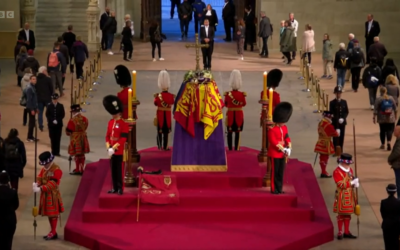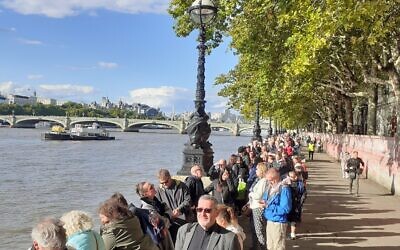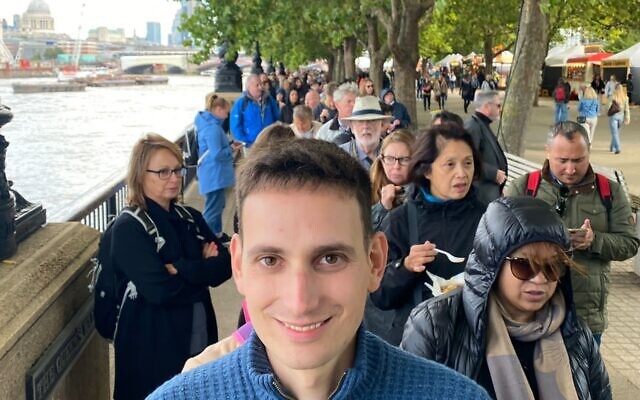OPINION: The Queen’s final act was to bring together many thousands for a unique pilgrimage
After queueing to see Her Majesty's coffin lying-in-state, Etan Smallman reflects on taking part in his greatest collective experience since volunteering at the London Olympics
It would be too much to call me a mourner. But well-wisher doesn’t seem to quite cover it.
I didn’t queue for 12 hours on Friday out of a duty to return a favour to our greatest public servant – my tributes are not much use to her now, and I’ve always thought that grieving rituals are really about those left behind.
When the line first began to form, I looked at it in horror. So why did I end up joining this river of humanity hugging the Thames, and shuffle 22,000 steps across central London alongside perfect strangers?
The best answer I can provide is that I wanted to mark an extraordinary life and an epochal shift in our country, and to do so communally. In our individualistic age (“A culture of iPod, iPhone, iTunes, i, i, i,” as Jonathan Sacks once so memorably put it), this proved to be the greatest collective experience I have had since volunteering in the Olympics Opening Ceremony a full decade ago. And, of course, I quickly realised that the line was not an ordeal to be endured. It became as significant as the few seconds we would get to spend processing past the royal catafalque.

They say death is the great leveller. But so is the Great British queue. It pays no heed to class or creed. Just ask David Beckham, who joined five hours ahead of me, without fanfare, bodyguards or a VIP speedy boarding pass.
Of course, the whole enterprise was absurd – largely excluding both the young and elderly. Of course, a basic lottery system could have been established, sparing the more than 400 people needing treatment from the ambulance service, including several who suffered head injuries after collapsing.
And, yet, even the cynic in me accepts that would have removed much of the spectacle, even romance, of the occasion. The Elizabeth Line became Britishness as performance art. It received its own microclimate, with its inclusion in BBC weather forecasts. Members of the public came to pay tribute to HM The Queue itself – at Westminster Bridge at about 5pm, one woman leaned over to ask us when we had started. Seven this morning, we told her. “Oooh!” she shouted back, open-mouthed. Throughout, I heard not an angry or agitated word. That may well be a first in the history of London.
Outside the BFI, the new Culture Secretary, Michelle Donelan, was there to greet us. Firemen handed us bottles of water from their engine close to the London Eye. Hi-vis priests from the “Faith Team” offered spiritual counsel near Lambeth Palace. At St Thomas’ Hospital, an opportunistic ticket seller tried to sign us up for a trip on a double-decker: “Fourteen hours? Just do the tour!”
The three-hour “snake” in Victoria Tower Gardens marked the final furlong, where six fellow pilgrims and I – who had befriended each other way back at Bermondsey Beach – inadvertently photobombed the BBC News at Six. As we readied ourselves for the Queen, it was moving to see soldiers’ berets and medals suddenly appear on heads and lapels.
Once past the airport-style security, the buzz of the queue was replaced by an awed hush as we walked down the steps of Westminster Hall, beneath the largest medieval timber roof in Northern Europe. We stood on the spot where Charles I was given his death sentence and where the Queen and Nelson Mandela (the only person who got away with calling her “Elizabeth”) addressed both houses of Parliament.

The only sound you could hear was your own footsteps, muffled by the newly installed beige carpet. Tall candles illuminated the coffin, draped in the Royal Standard and topped with the Imperial State Crown, the monarch’s orb and sceptre and a wreath of white roses and dahlias.
With no phones or cameras to spoil the moment, the picture was identical to that described by The Times in 1952, at the lying-in-state of George VI: “As the serene beauty of the scene exerts its spell there is a community of deep emotion.”
Before we were back out, to the bustle of Parliament Square just as all four of Her Majesty’s children arrived to stand vigil, a precious, silent chance to contemplate the meaning of service, nationhood – and mortality.
The Poet Laureate, Simon Armitage, last week wrote of “hands that can rest, now, relieved of a century’s weight”. But perhaps this was the Queen’s very last act of public devotion: bringing hundreds of thousands of her subjects together for a secular pilgrimage like no other.

Thank you for helping to make Jewish News the leading source of news and opinion for the UK Jewish community. Today we're asking for your invaluable help to continue putting our community first in everything we do.
For as little as £5 a month you can help sustain the vital work we do in celebrating and standing up for Jewish life in Britain.
Jewish News holds our community together and keeps us connected. Like a synagogue, it’s where people turn to feel part of something bigger. It also proudly shows the rest of Britain the vibrancy and rich culture of modern Jewish life.
You can make a quick and easy one-off or monthly contribution of £5, £10, £20 or any other sum you’re comfortable with.
100% of your donation will help us continue celebrating our community, in all its dynamic diversity...
Engaging
Being a community platform means so much more than producing a newspaper and website. One of our proudest roles is media partnering with our invaluable charities to amplify the outstanding work they do to help us all.
Celebrating
There’s no shortage of oys in the world but Jewish News takes every opportunity to celebrate the joys too, through projects like Night of Heroes, 40 Under 40 and other compelling countdowns that make the community kvell with pride.
Pioneering
In the first collaboration between media outlets from different faiths, Jewish News worked with British Muslim TV and Church Times to produce a list of young activists leading the way on interfaith understanding.
Campaigning
Royal Mail issued a stamp honouring Holocaust hero Sir Nicholas Winton after a Jewish News campaign attracted more than 100,000 backers. Jewish Newsalso produces special editions of the paper highlighting pressing issues including mental health and Holocaust remembrance.
Easy access
In an age when news is readily accessible, Jewish News provides high-quality content free online and offline, removing any financial barriers to connecting people.
Voice of our community to wider society
The Jewish News team regularly appears on TV, radio and on the pages of the national press to comment on stories about the Jewish community. Easy access to the paper on the streets of London also means Jewish News provides an invaluable window into the community for the country at large.
We hope you agree all this is worth preserving.






















